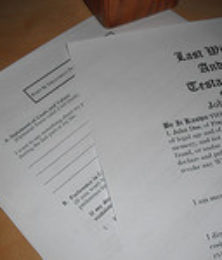
Some of my clients have millions of dollars. For them, estate planning is a necessary item on their lifetime checklist or else their estate will run into dire tax implications. For New York residents who die on or before March 31, 2014, an estate may be subject to the New York estate tax if the total of the federal gross estate, plus the federal adjusted taxable gifts and specific exemption, exceeds $1,000,000. Many New Yorkers fall into this category and for them, it is usually much cheaper to set up an estate plan then to pay estate taxes.
Things are changing though.
Going forward into the future the NY State Tax Law will be in constant flux until the year 2019. Part X of Chapter 59 of the Laws of 2014 amends the estate tax to decouple the tax from Federal law. The estate tax was commonly known as a “pick-up” tax because the tax equaled the Federal credit for state estate taxes as it existed on July 22, 1998. The unified threshold of $1 million is replaced with an applicable credit equal to the tax on a basic threshold amount equal to $2,062,500 for those dying in State Fiscal Year 2014-15; $3,125,000 in SFY2015-16; $4,187,500 in SFY2016-17; and $5,250,000 from April 1, 2017 to December 31, 2018. The basic threshold will equal the Federal basic threshold amount with annual indexing for those dying on or after January 1, 2019. The applicable credit is reduced for New York taxable estates exceeding the basic threshold amount and equals zero for those exceeding one hundred five percent of such amount. This is similar to the loss of the benefit of the $1 million unified threshold under previous law.
Gifts taxable under Section 2503 of the Internal Revenue Code that were not otherwise included in Federal Gross Estate and that were made during the three years ending on the date of death must be added to the New York Gross Estate. However, gifts made while the decedent was a nonresident of New York State and gifts made prior to April 1, 2014 or on or after January 1, 2019 are not included. The Generation Skipping Tax has also been repealed as of April 1, 2014. Taken from http://www.tax.ny.gov/pdf/stats/sumprovisions/summary_of_2014_15_tax_provisions.pdf
In my opinion this brings many more people back into the realm of “So why do I need a will now?” and the question that usually follows is then, “and why do I need an attorney to prepare it?”. Well, the answer is simple. You probably always needed a will, you might just not need that trust at this time. Let’s explore why:
1) First and most important. An attorney’s supervision of the execution ceremony gives rise to a rebuttable presumption that all of the requirements of the statute of wills were met. (Matter of Kindberg, 207 N.Y. 220, 100 N.E. 789 (1912). This is incredibly important. Will contests happen all the time. Take a second and think of your family. Now think what would happen if you threw a pot of money in the middle of a room on a day they all happened to be there? When an attorney supervises the will he or she drafted, it helps everyone form an orderly line and walk slowly to the pot, if they are entitled to walk to the pot at all. In essence, this helps a decedent’s wishes actually come to fruition.
2) Secondly, you can choose exactly who gets what. Without a will your estate will be divided by law, specifically Article 4 of the Estates, Powers and Trusts Law of NY (the EPTL). Discussing Article 4 is a separate blog entry.
3) Thirdly, simply put: a guardianship provision for your minor children.
There are other reasons, but let’s save something to talk about.



